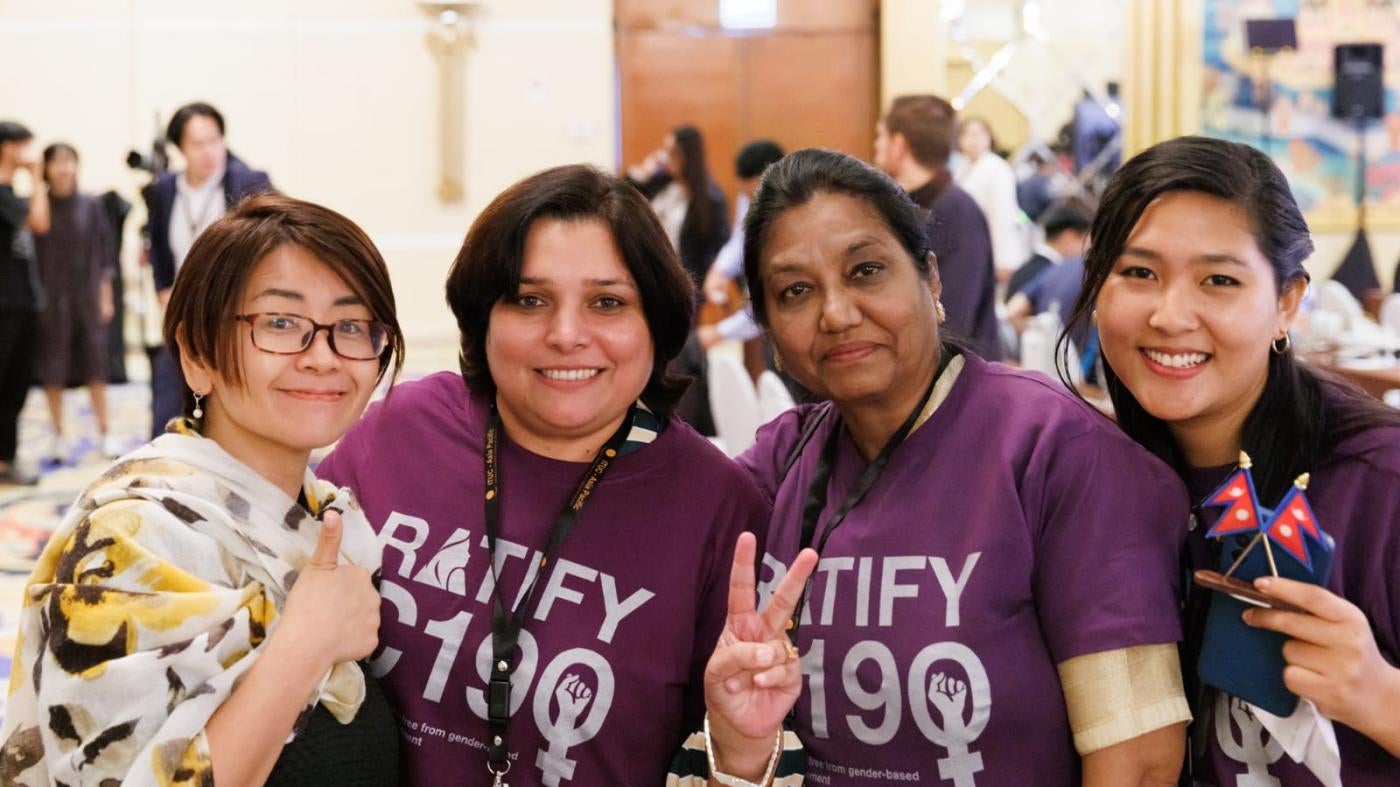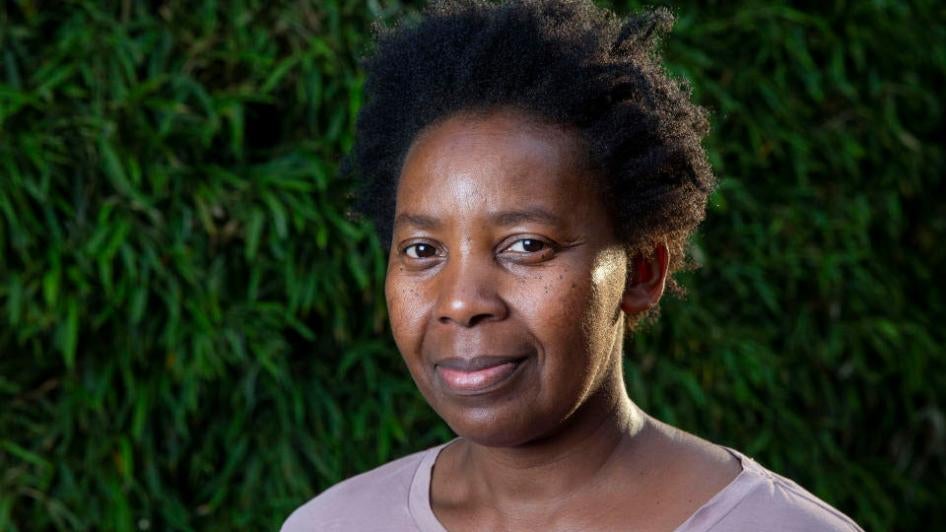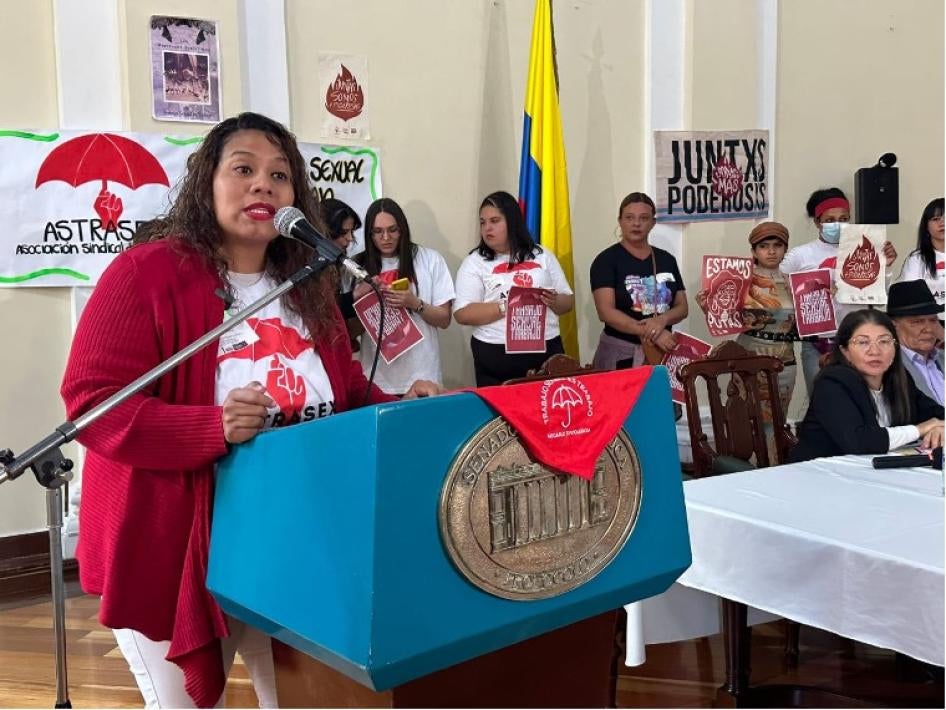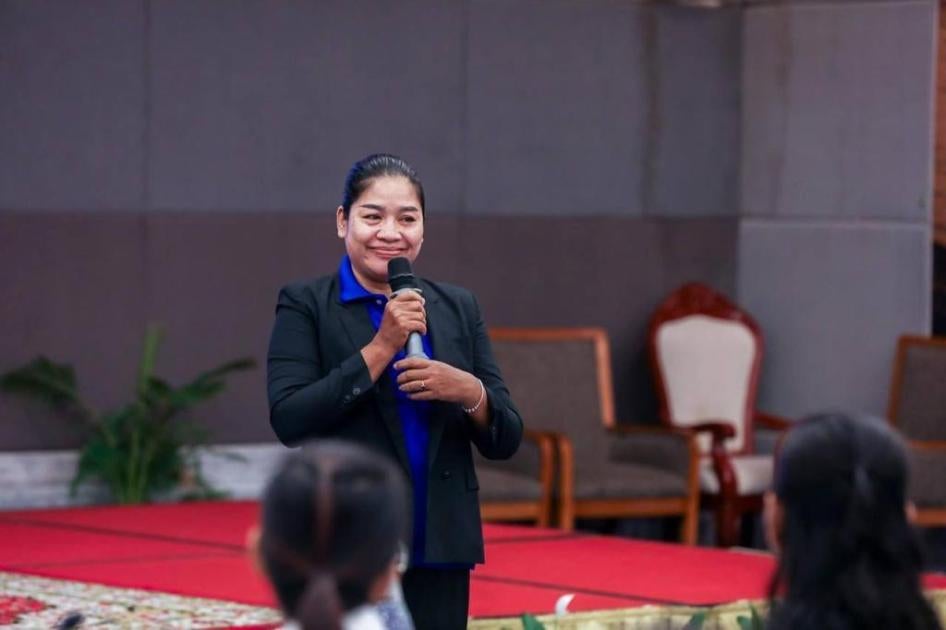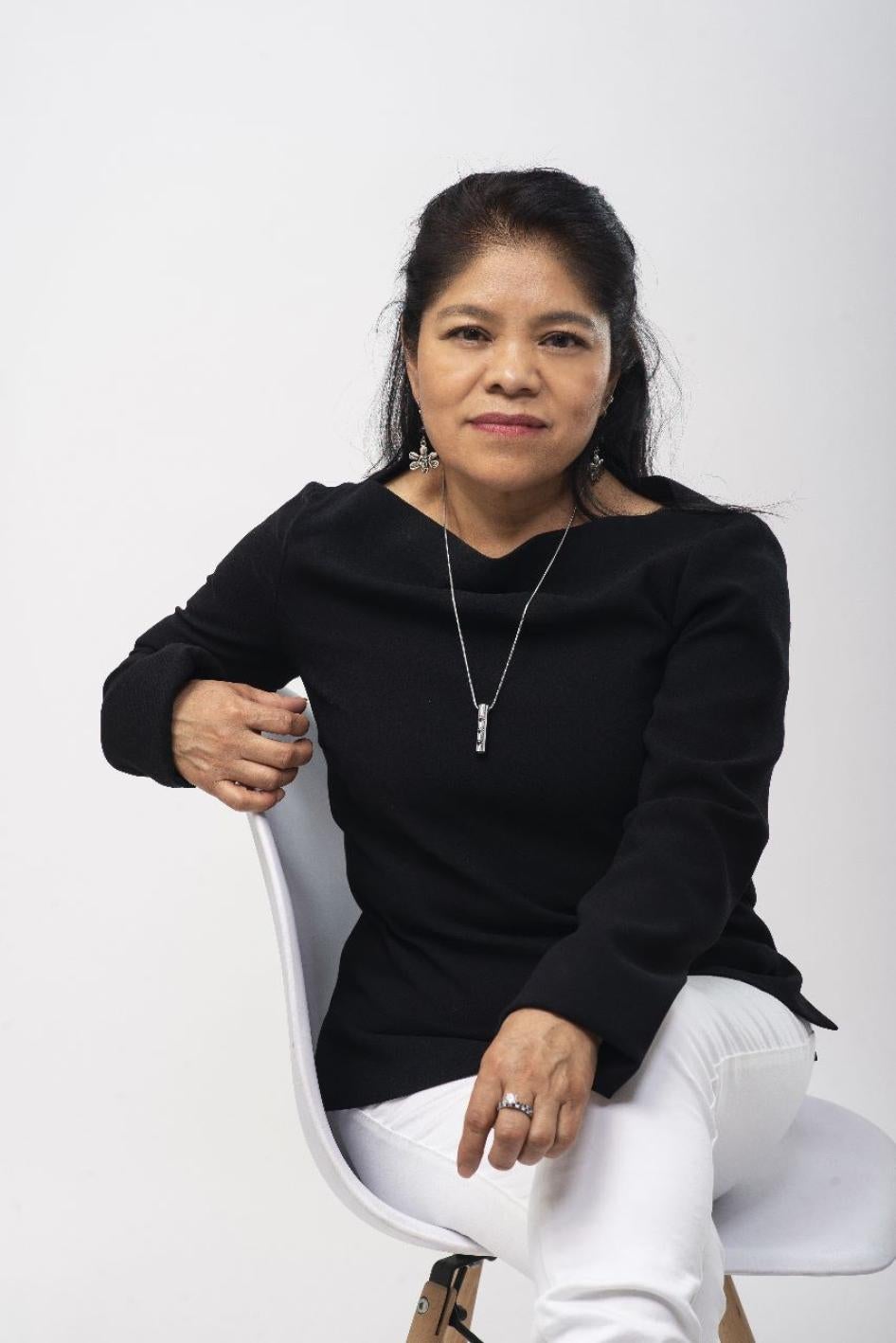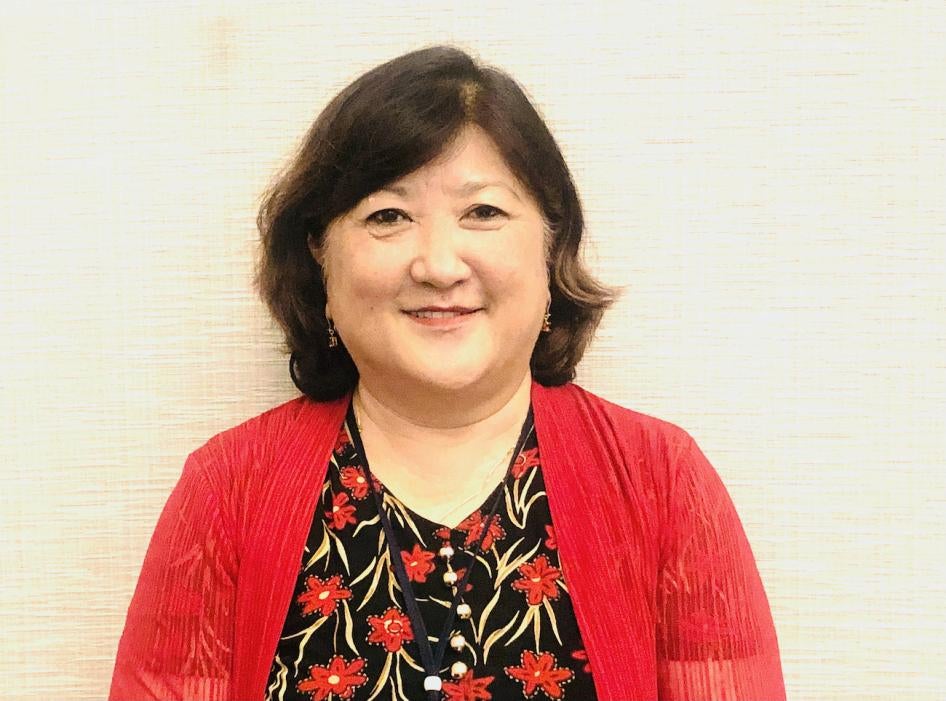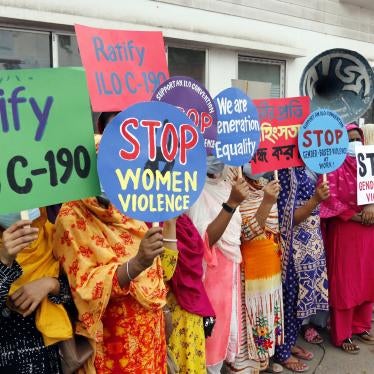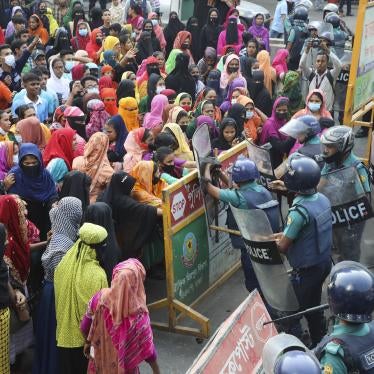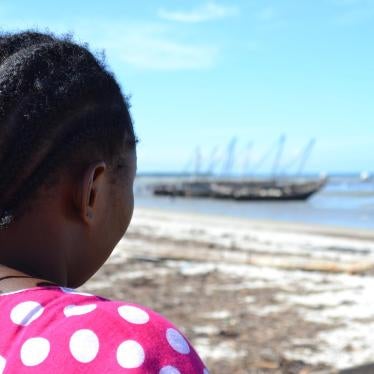This momentum is propelled forward annually during the 16 Days of Activism against Gender-Based Violence, a global campaign aimed at creating a world free from violence against individuals based on their gender or sex.
During this year’s 16 Days campaign, Human Rights Watch is spotlighting ten courageous advocates—rights activists, trade unionists, and worker’s rights leaders from around the world—who have dedicated years to combating gender-based violence in the world of work. We asked them to explain in their own words why advocacy against gender-based violence at work continues to be crucial.
Using powerful tools like the International Labour Organization (ILO) Convention on Violence and Harassment at Work (C190), a landmark treaty that lays out international legal standards for preventing and responding to violence and harassment at work, these activists’ efforts offer a vision of change where every individual can work free from violence and harassment.
Read their stories.
Lorraine Sibanda (Zimbabwe): President of StreetNet International and Zimbabwe Chamber of Informal Economy Associations
Lorraine Sibanda is a leader for informal economy workers globally, bringing an authentic voice to her advocacy drawn from her personal experience. Lorraine has worked jobs as a teacher, a cross-border trader, a vendor, and a goat farmer in Zimbabwe, where 65 percent of the people who trade in the informal economy are women. Her journey not only reflects resilience but underscores the vital role women play in informal sectors, which make up a large part of the economy in many countries but often lack adequate legal protections. Lorraine, among fellow activists and organizations, played an important role in ensuring informal workers are included in the protections laid out in C190.
"Gender-based violence is a gross human rights abuse. It takes away [a person’s] dignity and confidence, including for workers. People need to work confidently, being sure they are respected as human beings and they will not be subjected to any form of violence or harassment.
Together with StreetNet International, we are pushing and running campaigns to say that countries around the world should ratify C190. [This] is to ensure that, at the national level, workers can claim their rights and protections as guaranteed by the Convention. This means that women, who are particularly affected by violence, can then be legally protected by the Convention.
I am happy to say that the informal economy is part of C190 because of the efforts we made in lobbying, engaging, and presenting before the plenary and behind the scenes with different governments. [We told them] it is imperative that governments support the Convention so that workers in informal employment are protected, because they contribute to national development, GDPs, and because they are citizens of [their] countries. There is still a lot of work to be done in realizing protections on the ground, but we are ecstatic that we had the opportunity to contribute to C190."
Dur e Shawar (Pakistan): Chair of the National Women’s Committee and Vice President of Pakistan Workers Federation (PWF)
As vice president of the PWF, Dur e advocates for enhanced opportunities, policies, and recognition for women workers in Pakistan. She focuses on championing the rights of women in the informal economy and promoting gender equality within her trade union. Dur e is currently leading a campaign to pave the way for Pakistan’s ratification of C190, aiming to establish safer work environments and equal opportunities throughout the country.
"Gender-based Violence is not confined to physical harm; it's a pervasive violence that shatters education, health, income, inclusion, decent work, opportunities, and decision-making. Gender-based violence at work is one of the most significant hurdles for women in the workforce, and it's disheartening that this issue often remains unspoken and unaddressed.
Our advocacy efforts not only enhance the personal well-being [of women workers], but [they also] play a pivotal role in fostering a more inclusive and fair work environment.
This isn't just a matter of opinion; it's a fundamental aspect of creating a safe and equitable work environment that benefits everyone involved. Most of the women workforce [in Pakistan] is in informal employment and unrecognized. This significantly affects and limits opportunities for women, hindering their professional growth.
C190 is a welcome addition to existing laws addressing workplace harassment in Pakistan. It establishes a platform for effective reporting and complaint mechanisms, which can hold perpetrators accountable and protect the rights of workers, particularly women
I believe this should be the priority for all organizations working for women workers. Effective mechanisms must actively involve women workers. It's time to unite and take action."
Joanna Maranhão (Brazil): Coordinator at Sports & Rights Alliance
Joanna Maranhão is a former Olympian swimmer, activist, and a Network Coordinator at Sports & Rights Alliance, a coalition that includes Human Rights Watch and other nongovernmental organizations, as well as trade unions, working together to advocate for human rights in sports. A survivor of sexual abuse in sports, Joanna led a successful campaign to expand Brazil’s statute of limitations to allow survivors of child sexual abuse more reporting time, culminating in a law named in her honor.
"My advocacy journey is part of my healing journey. Because I was 21 when I publicly disclosed my case, the statute of limitations had already expired, and I was unable to press charges. I ended up being sued by [my abuser] which was a nightmare and so hard for me to understand. When I finally felt ready to share my story, justice was not there for me. Adding on to that the total negligence of Brazilian sports governing bodies back then, I had no choice but to do something.
So, I decided two things. [First,] I would not give up on swimming, regardless of how slow I was or how hard it was for me to be in that space. [Second], I would do everything in my capacity to ensure that others would not face what I was facing.
Trauma does not belong to the past and laws must ensure that we [can] take our time to disclose and report. When the bill was signed, I felt stronger than ever, like this advocacy could help me heal, but by no means was I satisfied. [Brazil’s] current reporting system is extremely violent and retraumatizes people all the time.
The work must continue, and that is the reason I do what I do."
Carolina Calle (Colombia): Executive Director of Calle Siete
Carolina Calle is the executive director of Calle Siete, an organization protecting and advancing the rights of sex workers, and a leader in the Colombian sex workers’ trade union, ASTRASEX. Carolina and her community are advocating for a comprehensive labor rights bill for sex workers in Colombia. Collaborating with other sex worker organizations, feminist allies, and lawmakers, she is advocating for labor protections, including access to social security, pensions, maternity and paternity leave, vacation days, and unemployment benefits. In this pivotal moment, Carolina and her partners stand at the forefront of legislative change and are advancing some of the most comprehensive labor rights policies for sex workers in the world.
"It is important to make visible the violence against women, and in the case of my struggle, the violence exercised daily against those who practice sex work. We are workers and many of us are unionized. Therefore, like other women, we seek dignified and fair conditions to exercise our work.
That we can work peacefully in our spaces is the first step that society can take so that we, as working-class women, can have a life that is more decent not only for us, but for our families who are the driving force motivating us to move forward and seek ideal working conditions.
C190 reminds society that women also deserve a [position] in the workplace, and that under no circumstances can we be harassed, mistreated, or assaulted in any way, just because we are women. For years, [men] have wanted to minimize us, because [they] have always been protagonists in the workplace. But ratifying this convention gives a clear message to society that today women can decide where to work and we can identify and denounce abuse."
Yang Sophorn (Cambodia): Leader of the Cambodian Alliance of Trade Unions
Yang Sophorn has long been a prominent voice in Cambodia’s independent trade union movement, where she has represented workers for more than 20 years. She has faced numerous obstacles and challenges in her work as a union leader, including arbitrary arrest and unjust convictions. Despite this, Sophorn continues to promote the rights of workers as the head of the Cambodian Alliance of Trade Unions, an independent trade union representing workers in Cambodia’s manufacturing sectors.
"Advocating against gender-based violence empowers all women to build up their self-confidence and make them feel powerful. In Cambodia, we have some [popular sayings] that demean and devalue women, making them feel worthless and unable to fight those in power. But as a union, we want to show our members and other workers that we have power. Our power comes through unity, and we believe that we can solve every issue when we come together. We can do it, we just need time, commitment, and patience. [With the government’s support instead of its] interference, the union's advocacy would bring hope to workers.
The labor market in Cambodia is limited and competitive, so workers who suffer from violence must endure it [in order to retain employment] because there is no [independent or effective] mechanism in place to solve their problems.
If the state ratifies C190, it has the potential to empower every woman, including the ones in the workplace, at home, in the community, and in the union. The government and employers should figure out a strategy to support women workers in finding solutions and to hold perpetrators [of abuse or harassment] accountable."
Precious Modupe Ojo (Nigeria): Sectional Leader at the Amalgamated Union of Foodstuff and Cattle Dealers of Nigeria
Precious Modupe Ojo (Iyaloja) is a market vendor in Lagos’ Mile 12 food market. For over two decades, she has been an active member with leading roles in the Amalgamated Union of Foodstuff and Cattle Dealers of Nigeria. Precious is also a community leader, traditional chief, and grassroots activist who advocates for women's and girls' rights. After Nigeria ratified C190 in November 2022, Precious participated in trainings conducted by the Nigerian Labor Congress and Solidarity Centre, seeking to put into practice C190’s extensive provisions to end gender-based violence and harassment (GBVH) in the world of work. Inspired by this, Precious and other Mile 12 market vendors formed a committee that has been working to make the market a safer place for everyone.
"GBVH is one of the most prevalent forms of human rights violations that affect women, particularly those in the informal sector. This is due to [weak] labor laws and exposure to unsafe working conditions, including the risk of sexual harassment. My participation in the Nigerian Labour Congress and Solidarity Center study revealed the significant level of GBVH in the Mile 12 market, where cultural stigma [associated with GBVH] and [the] male-dominated market [environment] often disadvantage women.
GBVH adversely affects women's productivity, profitability, and health. To combat this issue, we launched an anti-GBVH advocacy campaign, that included male allies, to manage complaints and investigation procedures [of GBVH cases in the market]. Additionally, we held advocacy meetings with key decision makers.
As a result of the practices and activities conducted to combat GBVH, the Mile 12 market has seen an increase in reporting of GBVH incidents, arrests, and prosecutions, with six perpetrators currently facing rape trials in the court in Lagos State. [In addition] to incidents of GBVH being reduced significantly, women were included in more leadership roles, and the market became a safer place for everyone."
Marcelina Bautista (Mexico): Founder of The National Center for the Professional Training and Leadership of Domestic Workers (Centro Nacional para la Capacitación Profesional y Liderazgo de las Empleadas del Hogar, CACEH)
Marcelina Bautista, a Mexican domestic workers’ rights activist and founder of the first national domestic workers’ union, became a domestic worker at 14 years old. During that work, Marcelina suffered mistreatment and exploitation, and decided things needed to change. Marcelina has since become a leading activist for domestic workers in Mexico. She founded CACEH, an organization promoting the wellbeing and rights of domestic workers. Marcelina’s activism, alongside other organizations, has catalyzed pivotal victories for domestic workers’ rights, including Mexico’s ratification of the ILO Domestic Workers Convention (C189). From a teenager whose rights were violated to a powerful fighter challenging injustice, Marcelina's journey is an inspiring testament to the transformative power of resilience and activism.
"C190 is fundamental to the promotion of the rights of workers, especially women, because it establishes a clear framework for addressing violence and harassment at work. Its ratification can improve the situation by providing a solid legal basis that obliges countries to implement preventive and protective measures. This not only strengthens job security, but also contributes to shifting the work paradigm and promoting more equitable and safer working environments for all.
Many domestic workers have experienced harassment, [including] sexual harassment, in their work environment. Thanks to the promotion and ratification of C190, our country can and should implement preventive measures and complaint protocols. For domestic workers to feel empowered to denounce harassment, these actions can result in a safer environment.
This and the promotion of labor rights, in conjunction with C190, can have a tangible impact on workers' lives by providing tools to address and prevent gender-based violence in the workplace."
Bijaya Rai Shrestha (Nepal): Executive Director of Returnee Women Migrant Workers’ Group (Aaprabasi Mahila Kamdar Samuha, AMKAS)
Bijaya Rai Shrestha worked as an undocumented migrant worker in Japan before returning to Nepal, when she decided to dedicate her life to promoting the rights of women migrant workers. Bijaya founded AMKAS, a nongovernmental organization run by and for returnee women to support Nepali migrant workers. Through AMKAS, Bijaya not only supports and empowers returning migrant women but also advocates for systemic change, leaving an indelible mark on the landscape of migrant worker rights in Nepal.
"Gender-based violence is the main reason most women migrants suffer, which impacts their lives and wellbeing. Being a leader of an organization of returnee women migrants, women migrants’ safety, security, and well-being is my priority. My mission and goal are to one day see women migrants enjoying all their basic human rights without abuse and exploitation in their world of work.
We have been working very hard to ratify the Domestic Workers Convention C189 [in Nepal] as it also protects the rights of migrant domestic workers. We are now also working on advancing C190, as it protects not only domestic workers’ rights but significantly advances migrant workers’ rights, especially women. Ratification of [C190] will protect women migrants from abuse, harassment, and sexual exploitation, which will improve the situation for women migrant workers in the world of work.
I’m a returnee migrant myself. The desperate stories of migrant domestic workers have motivated me to be their voice for the last 20 years. I have listened to them, cried with them, united them, and educated them. Now together we are fighting for our rights from [the] community to the national and international arena where I can see the real-world impact of our work in combating GBV and promoting labor rights of women in the world of work."
Baia Pataraia (Georgia): Human Rights Lawyer and Executive Director of Sapari
Baia Pataraia has been at the forefront of women's advocacy in Georgia for over a decade. She leads the prominent Tbilisi-based women's organization Sapari and in 2014 founded the Georgian Women's Movement, the largest informal feminist group in the country. Having worked in the Ministry of Justice and in her tenure as a visiting lecturer since 2008, Baia has championed women's rights, leading various advocacy activities and social campaigns while also serving as a national expert in training judges, prosecutors, and lawyers on critical gender issues and anti-discrimination law. Baia’s organization Sapari represented, and won, what is considered the country’s first sexual harassment case, representing a woman journalist who filed claims against her former boss.
"Every person needs a safe space to work. Gender-based violence, including sexual harassment, creates a hostile environment at work. If the employer does not care and does not have a structure to address gender-based violence at the workplace, they cannot guarantee a safe working environment. I know women who have left their jobs because of sexual harassment; they were not able to protect their rights, they have never been offered any solutions at work, so they just left, which is a serious problem.
Several years ago, our organization, Sapari, won the very first case in Georgia on sexual harassment, when we did not even have legal regulations prohibiting sexual harassment. The case was strategic and exposed the need for regulations and regulatory bodies at workplaces, which should be able to address any cases of discrimination and violence. [While we do have laws now], still very few people go to court. Unfortunately, it is still believed that women should deal with their problems without involving their employer, police, or courts."
Lita Anggraini (Indonesia): Coordinator, National Network for Domestic Worker Advocacy (Jaringan Nasional Advokasi Pekerja Rumah Tangga, Jala PRT)
Lita Anggraini is a trailblazing activist in Indonesia, having dedicated over 30 years to advocating for the rights of domestic workers. Lita is a founding member of the International Domestic Workers Federation and coordinator of Jala PRT in Jakarta. She has been instrumental in drafting and promoting the Domestic Worker Protection Bill, proposed in 2004, a historic development that aims to recognize and protect the rights of almost 5 million domestic workers in Indonesia, 80% of whom are estimated to be women, serving as primary breadwinners for their families. However, this bill has been stalled in parliament for 19 years, and as a response, Lita coordinated a national hunger strike to push for its long-overdue passage.
"Domestic work is one of the oldest professions in the world. Domestic workers comprise a significant part of the workforce in informal employment and are among the most vulnerable groups of workers. They work for private households, often without clear terms of employment, unregistered and excluded from the scope of labor legislation.
Domestic workers are workers. They provide essential services. But they are excluded from Indonesia’s Labour Law and have no access to labour rights or protections.
Five million domestic workers [in Indonesia], most of them women, work in modern slavery. They face some of the most strenuous working conditions and are vulnerable to exploitation, violence, harassment, human trafficking, and restrictions on freedom of movement. [They] work and live in hunger. Meanwhile, the state is absent and lets this happen.
That is why Jala PRT is conducting a rotating relay hunger strike in front of the Parliament to protest and press [legislators] to deliberate and pass the domestic worker's law.
It is an unfair, unequal situation that [the] state asks domestic workers to do care work but does not care for domestic workers."
